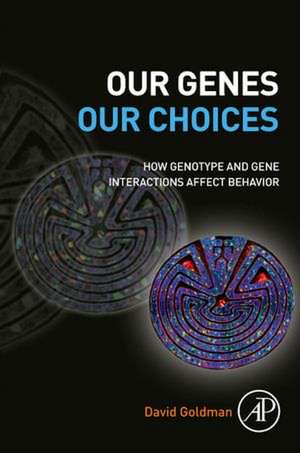Our Genes, Our Choices: How Genotype and Gene Interactions Affect Behavior
Autor David Goldmanen Limba Engleză Paperback – mai 2012
Author David Goldman uses judicial, political, medical, and ethical examples to illustrate that this lifelong process is guided by individual genotype, molecular and physiologic principles, as well as by randomness and environmental exposures, a combination of factors that we choose and do not choose.
Written in an authoritative yet accessible style, the book includes practical descriptions of the function of DNA, discusses the scientific and historical bases of genethics, and introduces topics of epigenetics and the predictive power of behavioral genetics.
- First Prize winner of the 2013 BMA Medical Book Award for Basic and Clinical Sciences
- Poses and resolves challenges to moral responsibility raised by modern genetics and neuroscience
- Analyzes the neurogenetic origins of human behavior and free will
- Written by one of the world's most influential neurogeneticists, founder of the Laboratory of Neurogenetics at the National Institutes of Health
| Toate formatele și edițiile | Preț | Express |
|---|---|---|
| Paperback (2) | 342.22 lei 5-7 săpt. | |
| ELSEVIER SCIENCE – mai 2012 | 342.22 lei 5-7 săpt. | |
| ELSEVIER SCIENCE – 8 sep 2023 | 562.72 lei 5-7 săpt. | +63.28 lei 6-12 zile |
Preț: 342.22 lei
Preț vechi: 425.43 lei
-20% Nou
Puncte Express: 513
Preț estimativ în valută:
65.49€ • 70.02$ • 54.60£
65.49€ • 70.02$ • 54.60£
Carte tipărită la comandă
Livrare economică 11-25 aprilie
Preluare comenzi: 021 569.72.76
Specificații
ISBN-13: 9780123969521
ISBN-10: 0123969522
Pagini: 272
Dimensiuni: 152 x 229 x 15 mm
Greutate: 0.48 kg
Editura: ELSEVIER SCIENCE
ISBN-10: 0123969522
Pagini: 272
Dimensiuni: 152 x 229 x 15 mm
Greutate: 0.48 kg
Editura: ELSEVIER SCIENCE
Public țintă
Students and researchers involved in human genetics, medical genetics, behavioral genetics and neurogenetics.Cuprins
Chapter 1: INTRODUCTIONChapter 2: The Jinn in the genomeChapter 3: 2B or not 2B?Chapter 4: Stephen Mobley and his X-chromosomeChapter 5: Dial Multifactorial for Murder: The intersection of genes and cultureChapter 6: Distorted capacity: The measure of the impaired willChapter 7: Distorted capacity: Neuropsychiatric diseases and the impaired willChapter 8: Inheritance of Behavior and Genes “For Behavior Gene WarsChapter 9: The scientific and historic bases of genethics: Who watches the geneticists and by what principles? Chapter 10: The world is double helical DNA, RNA and proteins, in a few easy piecesChapter 11: The stochastic brain: From DNA blueprint to behaviorChapter 12: Reintroducing genes and behavior Chapter 13: Warriors and WorriersChapter 14: How many genes does it take to make a behavior? Chapter 15: The genesis and genetics of sexual behaviorChapter 16: Gene x environment interaction Chapter 17: The epigenetic revolution: Finding the imprint of the environment on the genomeChapter 18: DNA on TrialChapter 19: Parents and children: Neurogenetic determinism and Neurogenetic individualityChapter 20: Summing up genetic predictors of behavior
GlossarySuggested readingsIndex
GlossarySuggested readingsIndex
Recenzii
"Our genes, our choices’ is thought provoking and well argued…With its witty writing style, many personal accounts and analogies to books and movies, ‘Our genes, our choices’ is far from being a textbook and should be of interest to a wide range of readers." --Human Genetics online, October 2012
"...the complexity of human behavior and a person's ability to choose is explained as deriving from a relatively small number of genes which direct neurodevelopmental sequence. The author uses judicial, political, medical, and ethical examples to illustrate that this lifelong process is guided by individual genotype, molecular and physiologic principles, as well as by randomness and environmental exposures we choose and do not choose." --Doody.com, April 2013
"In a bold, new integrative treatment of the confusing facts and fictions about human behavior and genetic determinism, David Goldman has provided a user-friendly death to determinism and a rebirth of genetic probabilism. He uses his breadth and depth of neuroscience experience to optimize the necessary reductionism for understanding violence, impulsivity, depression, anxiety, and personality variations while explaining the newest technologies of the researcher with access to the laboratories of the National Institute of Health and his colleagues. He bravely confronts the numerous ethical dilemmas that arise when dealing with new knowledge about our genetic makeup and their implications for good and evil. Drawing on his personal exposure to mental disease in his own family, his sensitive and energized writing reminds me of Sylvia Nasar’s explication of "A Beautiful Mind", now giving us a beautiful genome from a self-described "behavioral genomicist." We are treated to an insider’s knowledge about the work and hoopla about a gay gene and what may be a better conceptualization closer to the facts. Freed from the constraints of journal writing with its 3 to 6 page shackles, Goldman tackles the utility of race as a construct without racism, communist ideology in science, insurance discrimination against the mentally ill, free will, and even pedophilia. His work provides essential reading across the humanities, social and medical sciences, and the courtroom. As fascinating as any whodunit, he tries to account for the origins of our behavioral outcomes, for good or for evil or for mental anguish –was it genes, was it environment or culture, or bad luck, or a conspiracy among some subset of culprits? I won’t give it away –read the book." --Irving I. Gottesman Ph.D., Hon.FRCPsych, Bernstein Professor in Adult Psychiatry & Senior Fellow, Department of Psychology University of Minnesota & Sherrell J. Aston Professor of Psychology Emeritus, University of Virginia
"...the complexity of human behavior and a person's ability to choose is explained as deriving from a relatively small number of genes which direct neurodevelopmental sequence. The author uses judicial, political, medical, and ethical examples to illustrate that this lifelong process is guided by individual genotype, molecular and physiologic principles, as well as by randomness and environmental exposures we choose and do not choose." --Doody.com, April 2013
"In a bold, new integrative treatment of the confusing facts and fictions about human behavior and genetic determinism, David Goldman has provided a user-friendly death to determinism and a rebirth of genetic probabilism. He uses his breadth and depth of neuroscience experience to optimize the necessary reductionism for understanding violence, impulsivity, depression, anxiety, and personality variations while explaining the newest technologies of the researcher with access to the laboratories of the National Institute of Health and his colleagues. He bravely confronts the numerous ethical dilemmas that arise when dealing with new knowledge about our genetic makeup and their implications for good and evil. Drawing on his personal exposure to mental disease in his own family, his sensitive and energized writing reminds me of Sylvia Nasar’s explication of "A Beautiful Mind", now giving us a beautiful genome from a self-described "behavioral genomicist." We are treated to an insider’s knowledge about the work and hoopla about a gay gene and what may be a better conceptualization closer to the facts. Freed from the constraints of journal writing with its 3 to 6 page shackles, Goldman tackles the utility of race as a construct without racism, communist ideology in science, insurance discrimination against the mentally ill, free will, and even pedophilia. His work provides essential reading across the humanities, social and medical sciences, and the courtroom. As fascinating as any whodunit, he tries to account for the origins of our behavioral outcomes, for good or for evil or for mental anguish –was it genes, was it environment or culture, or bad luck, or a conspiracy among some subset of culprits? I won’t give it away –read the book." --Irving I. Gottesman Ph.D., Hon.FRCPsych, Bernstein Professor in Adult Psychiatry & Senior Fellow, Department of Psychology University of Minnesota & Sherrell J. Aston Professor of Psychology Emeritus, University of Virginia




















